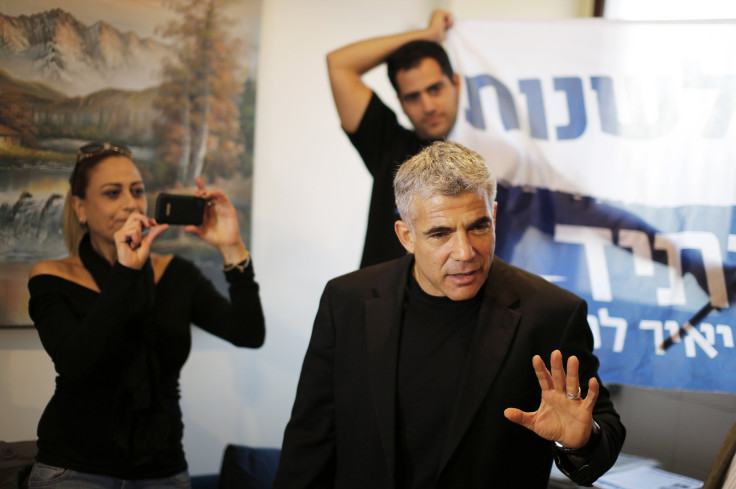Israeli Elections From The Palestinian Side: Is There Hope For Peace Anytime Soon?

To many Mideast watchers, the Palestinian issue is the fundamental problem in the region. But according to some attendees at a discussion Tuesday at the Palestine Center in Washington, D.C., on what the results of last week's Israeli elections could mean for the Palestinians and the peace process, that is not the case. In fact, according to one attendee, it means about as much to Israelis as Native American issues mean to average Americans: very little.
The forum featured Yousef Munayyer, the executive director of the Jerusalem Fund, a pro-Palestinian nonprofit; P.J. Crowley, former U.S. assistant secretary of state for public affairs; and Guy Ziv, assistant professor at the School of International Studies at American University in Washington.
Indeed, both Ziv and Munayyer noted that Palestinian issues (and related topics of peace, security and any solution to the conflict) were largely set aside in this recent Israeli election, while economic concerns dominated the airwaves.
“This is the first time where the ‘peace and security’ issue were not front and center,” Ziv said. “Traditionally, that’s what Israeli elections are all about, but this time it was about the bread and butter issues.”
For Munayyer, this was evidence that the Jewish Israeli population is growing comfortable with the continued occupation of the Palestinian territories, with no end in sight.
“It is remarkable that the peace question was not a major issue,” Munayyer said. “The occupation has become acceptable to Israelis. There’s no movement, no sense of urgency to bring this to an end. They’ve become complacent [about] the military occupation of millions of people.”
If this is true, then a record number of Israelis have either become complacent or no longer view the question of Palestine as the most important one on the table.
Voters in this election turned out in the highest numbers since 1999, and that includes Palestinian citizens: 55 percent of them voted, up three percentage points from the last election in 2009, Munayyer said. This, despite a very vocal movement among Arab Israelis to boycott the elections.
However, turnout also climbed in communities of Israeli settlers in the West Bank: 78 percent voted, as opposed to 74 percent in 2009. Settlers tend to vote on the opposite end of the political spectrum from Palestinians, Munayyer said, and settlers are a growing and influential voice within the Israeli electorate.
The general rightward swing of Israeli politics was not comforting to those supporting the Palestinians, despite the surprise emergence of the new centrist party Yesh Atid (There Is A Future), whose leader Yair Lapid has called for the resumption of peace talks with Palestinians.
Ziv classified the rise of the right as the “tea party-ization” of Israeli politics.
“The similarities between the tea party in this country and some of what we’ve seen in Israel are striking,” he said, citing the ouster of moderate Republicans in the U.S. in favor of tea party picks, and the rise in the ranks of hard-right ideologues like Danny Danon in the ranks of Prime Minister Benjamin Netanyahu's Likud party.
And if the right didn’t do as strongly as predicted, that was in part because, Ziv said, Israelis are “uncomfortable about the radicalization of the right. They’ve been disturbed by what they see.”
But despite the centrist upsurge, both Munayyer and Crowley said they didn’t see the situation changing, or the peace process restarting anytime soon. In fact, Munayyer is distrustful of Yair Lapid.
“We don’t know too much about Lapid, but we do know he decided to initiate his campaign in the settlement of Ariel, which he said he believed will forever be a part of Israel, and that he opposes the division of Jerusalem,” Munayyer said. “So what we do know is not encouraging. But we don’t know much.”
“The best thing that could be said is that this could be worse,” Crowley said, “And that’s not necessarily bad!”
The problem, Crowley asserted, was twofold: First there was the drastic change in the security situation in the Middle East, (e.g. the 'Arab Spring'), which knocked the Israeli-Palestinian issue off of its number one spot on the list of the world’s priorities. Second, partly as a result of the Arab Spring, “the dynamics among the various players has transformed,” Crowley said.
“We do not have [former Egyptian president] Hosni Mubarak, we have [current president Mohammed] Morsi, with a more populist mandate. We have King Abdullah [of Jordan], who has his hands full with Syrian refugees. And here in the U.S., there is a lack of rapport between [U.S. President Barack] Obama and Netanyahu."
“There is an absence of a real leadership dynamic,” Crowley added. “That is very telling in terms of why the [peace] process has been stuck for two years. I don’t see anything coming out of Israeli elections, or the U.S. elections, that is going to change that in short- to mid-term.”
Crowley argued that in order to revive the peace process, one needs the right constellation of world leaders with a good rapport.
But Munayyer wasn’t buying that argument.
“We can’t wait for the planets to align to say ‘Now is the time for Palestinian self-determination.’ That time is long overdue.”
© Copyright IBTimes 2025. All rights reserved.






















